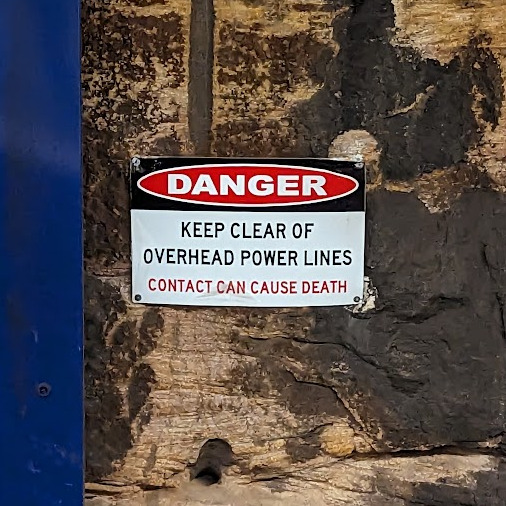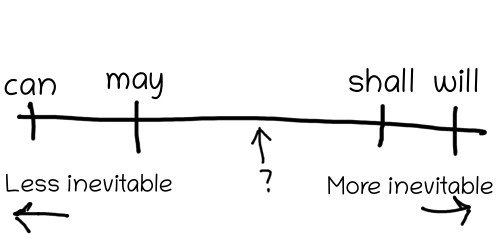The English language needs a new modal verb denoting an epistemic modality - specifically one that expresses a modality of probability. I propose the word “ween” (/we꞉i꞉n/ way-in). The preterite form is “weend” (/we꞉i꞉nd/ way-ind), though I am uncertain as to when one would use the preterite form.
As an example of expressing a modality of probability, here’s an example sentence: “Touching live wires ween kill you”, which means “There is a probability that you will be killed if you touch live wires”.
The English language has quite a few modal verbs: “can”, “may”, “shall”, “will” (their preterite forms are “could”, “might”, “should”, and “would” respectively.) Each of these words change the mode of the verb following it. For example, in the sentence “I can jump”, the word “can” modifies the word “jump” to give the sentence a meaning of “I have the ability to jump”. We say that the word “can” denotes a modaility of ability.
The word “may” denotes two possible modalities: possibility and permission. When a teacher tells a student “you may go to the bathroom”, the teacher is giving permission to the student to go to the bathroom. Consider the sentence “You may injure yourself if you play with scissors”. Here “may” denotes a modality of possibility - it’s possible that you get hurt from playing with scissors. The modality of possibility and permission are somewhat intertwined - possiblity is simply permission from God. If you consider that for the vast majority of the history of the English language (up to Old English), English speakers were largely under the influence of Judeo-Christian mythology. Thus when the word “may” denotes possibility, it also denotes permission (from God).
I will admit I’m rather jealous of the German modal words “sollen” and “mögen”. “Sollen” in particular stands out - it’s quite like “shall” in English*in fact "shall" is a cognate of "soll", but with an added sense of expectation or obligation. Dedekind’s Was sind und was sollen Zahlen - or in English: “what are and what should numbers (be)” - was a particularly interesting*be warned though, it is a very tedious read especially if you have only a very minimal grasp on German (like me) - I read it side by side an English translation. paper to read if you have a chance to read. Here, “sollen” expresses more of an expectation in a raison d’être sense - the “so what” of numbers*Pedantry: natural numbers. In fact, German seems to have quite a few more modal verbs than English, so why not add a few more to English?
Why the modality of probability though? This all started by me being quite annoyed at a warning sign at a train station. The sign is reminiscent of the first example sentence in this blog post.

A sign at North Sydney station that says 'DANGER. KEEP CLEAR OF OVERHEAD POWER LINES. CONTACT CAN CAUSE DEATH'
This to me is a poor warning sign. It isn’t assertive enough in its message due to its use of “can”. It is possible that one reads the sign and go “oh, touching the power lines has the ability to bring about one’s death… but that’s just the ability, which says nothing about its eventuality or its possibility. Meh”, then touch the power lines.
A stronger sentence would be “CONTACT WILL CAUSE DEATH”. But that is too strong. It indicates an inevitable eventuality. Which makes it not a true statement.
What about “CONTACT MAY CAUSE DEATH”? I personally think it’s too weak still. It indicates a possibility - there’s a possibility that one dies as a result of touching the power lines. To my mind, possibility is just one step up in strength from ability. On the spectrum of ability to inevitability, there seems to be a gap*In case you're wondering why I left off "must", it's because I've not introcued the word in the paragraphs above.:

So here’s problem: statements that are true are too weak in their warning. Statements that are strong are not true.
And so I thought to myself that there ought to be*did you catch the imperative modal verb "ought to"? a modal verb for something stronger than possibility but weaker than inevitable eventuality, which would still yield a true statement. If I were to word the sign differently, it’d go something like “there’s a probability that you will die if you touch the power lines"*A less cumbersome sentence is "you would probably die if you touch the power lines", but this sentence itself uses a modal verb, "would", which would muddy the meaning of this blog post.. This would be a true statement, and it would be stronger in denoting the eventuality of the situation.
Now, I know English’s modal verbs derive from Old English - “can” comes from “cunnan”, “may” comes from “mag”, “shall” comes from “sculan” and so on and so forth. So I searched the Old English Translator for any words that have to do with probability. I was initially a bit doubtful that I’d be able to find a good word - afterall, people in the past do not think of probabilities the way we do today. Much to my surprise, I found “Ƿenan"*Because Ƿ is hard to keep typing, like the Old English Translator, I will replace it with its modern English equivalent - the character 'w'. Its singular first person present form is “wēne” (/we꞉nɛ/ wayh-neh), and much like (“can”, “could”), (“will”, “would”), (“shall”, “should”), its singular first person preterite form is “wēnde” (/we꞉nd/ wayh-n-deh).
Once I have a root word, I worked my way to find a modern cognate. I reasoned that because it’s not going to be a frequently used word compared to other words (again, I ask, what use have ancient people with probability?), it would survive the Great Vowel Shift. Where in the Shift, /e꞉/ becomes /i꞉/, the sound would be stuck mid-transition, becoming /e꞉i꞉/ *Originally I figured that /ɪ/ would be a better phone, but that led me to the word "win" which is a modern English word already.. I also reasoned that as part of the English standardization effort in the 14th century, the trailing “e” would have been dropped, much like “cuðe” became “cuð"*which then became "cud", which then became "could". Pronuciation precedes spelling, and so when spelling out /we꞉i꞉n/, it’d become “ween”.
I’ve been using “ween” in daily life now. How’s it going? My wife recently sent me this picture, which I think sums it all up:
